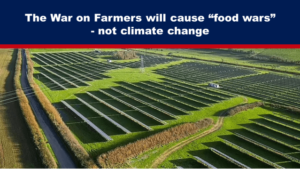The War on Farmers will cause “food wars”
Speaking at the Redburn Atlantic and Rothschild consumer conference recently, Sunny Verghese, Olam Agri’s CEO, said trade barriers imposed by countries are exacerbating inflation and pushing countries into conflict over waning food supplies.

“Big agricultural commodity traders, which reaped record profits in 2022 after Russia’s full-scale invasion of Ukraine sent food prices soaring, have been accused of exacerbating flood price inflation through profit-boosting mark-ups,” the Financial Times said.
“Food prices started to climb in the wake of covid and surged following Russia’s invasion of Ukraine as some exports of grain and fertilisers were blocked by the conflict. This deepened food insecurity in poorer countries and left consumers all over the world facing a cost-of-living crisis,” the news outlet noted.
But Verghese argued that elevated food price inflation was in part the result of government intervention. A proliferation of non-tariff trade barriers in 2022 in response to the war had “created an exaggerated demand-supply imbalance.”
The gist of his argument is that trade barriers and protectionist policies are creating tensions between countries, leading to conflicts over food supplies while climate change is affecting global food production, leading to shortages and price increases, which can spark conflicts over resources.
While Trade barriers and conflicts can lead to price increases, making food unaffordable for many people, conflicts over food supplies can lead to food insecurity, malnutrition and even famine. And “food wars” could have a significant impact on the global economy, leading to economic instability and recession.
If there is a concern about “food wars,” why are governments of Western nations waging a war on farmers in the name of climate change?
The War on Farmers is a global phenomenon and it has been gaining momentum in recent years. Various forms of attacks, restrictions and policies imposed on farmers by governments, corporations and environmental groups, threaten farmers’ livelihoods, national food security and the global food supply.
For example, the Dutch government has imposed strict regulations on farming practices, which has led to protests and concerns about food security.
Another example is the US government’s policies, such as the Renewable Fuel Standard, which have led to increased costs for farmers and reduced crop yields, making it difficult for them to compete with large corporations.
The War on Farmers continues. Recently, livestock farmers in Denmark were warned that the farts and burps from their cows, sheep and pigs will be measured and taxed from 2030, the first country in the world to do so as it targets methane emissions.
And the No Farmers No Food campaign posted the video below of a British farmer. “We’re now being paid to stop growing food and grow wildflowers,” he said.
“We’ve had enough.” pic.twitter.com/UNDe2tgC2I
— No Farmers, No Food (@NoFarmsNoFoods) June 26, 2024
Other policies regarding “climate change” that are destroying farming include the installation of “green” energy sources on prime agricultural farmland. A UK petition to stop mass-scale solar panels from being installed on prime agricultural land states: “Utilising prime farmland for mass-scale solar energy projects ……. puts our future food security at risk.”
It’s not global warming or a climate change “emergency” that could cause “food wars” – it’s the War on Farmers. It’s the attacks on farmers that have the consequences of creating food shortages, food insecurity and economic instability.
But that’s not Olam Agri’s worldview. At the Redburn Atlantic and Rothschild consumer conference, Verghese urged the gathering of consumer industry executives, including the bosses of Coca-Cola and Associated British Foods, to “wake up” and take more action on “climate change”. Governments should charge a tax for carbon, he argued.
This is the hypocrisy of the climate crisis agenda and it is a self-fulfilling prophecy. Waging a War on Farmers to “fight climate change” and then blaming “climate change” for “food wars” is a never-ending cycle of problem-reaction-solution. It is the old tactic of manipulating public opinion and controlling society by creating a problem, eliciting a reaction and then offering a pre-determined solution. A solution that only benefits self-styled elites and their agendas.
yogaesoteric
July 3, 2024
